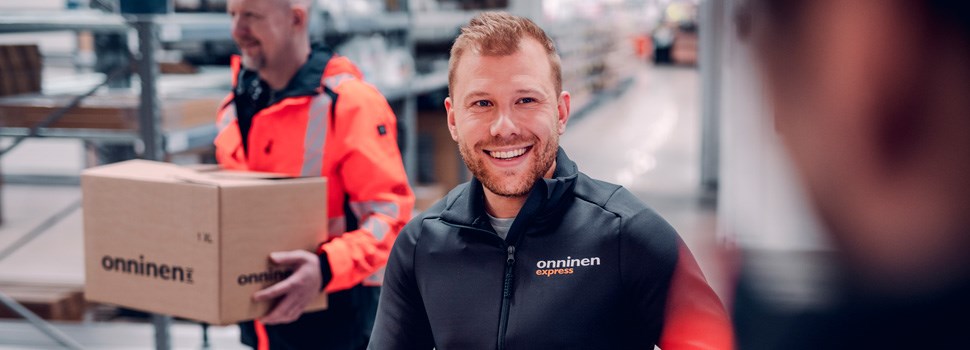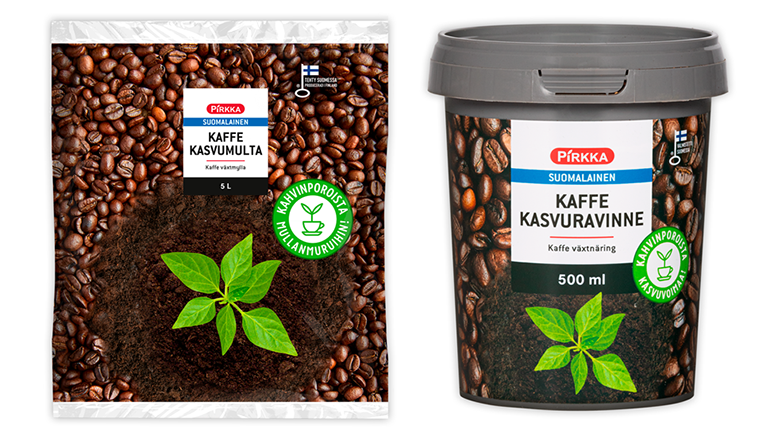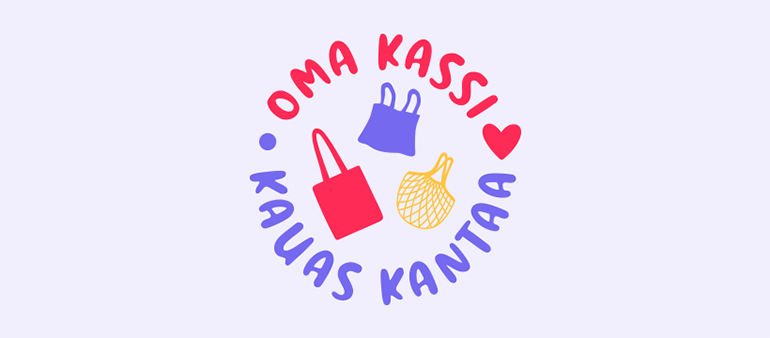
Circular economy

Our targets and commitments
Our target is to improve our waste recycling rate by six percentage points by the end of 2030 compared to the 2024 baseline.
| 2024 | 2023 | |
| Waste recycling rate, % | 67 | 67 |
Kesko’s grocery trade division is committed to halving its food waste percentage from the 2019 baseline by 2030. The commitment covers Kesko’s warehousing and logistics operations, as well as K-food retailers’ store operations.
We are also committed to the food industry’s material efficiency commitment, where our goal is to reduce food waste and achieve a 4% increase in the waste recycling rate in our own operations and at the K-food stores by the end of 2026 compared with 2019, when the recycling rate was 74%. At the end of 2024 the recycling rate at food stores covered by our centralised waste agreement was 81%, which is two percentage points higher than in the previous year.
We were the first company in the retail sector to join the Construction Plastics Green Deal agreement. The goal of the agreement is to promote the circular economy of plastics by reducing the use of plastic and promoting the recycling of plastic in the construction industry. We have also joined the SUP Green Deal, which aims at reducing the consumption of portion packaging. Under this agreement, we are reducing the amount of single-use plastics in portion packaging in the grocery trade and developing new packaging solutions with our partners.
Circular Economy and Waste Management Programme
The Circular Economy and Waste Management Programme presents Kesko's strategy for circular economy practices and waste management. The programme includes our strategy, targets, and policies related to circular economy and details our measures to prevent waste, practices on recycling and circular economy, and management of hazardous waste. Additionally, the programme outlines stakeholder engagement, compliance and reporting, and innovation and technology related to circular economy and waste management.
The Circular Economy and Waste Management Programme is available here.
In Kesko’s car trade division, K-Auto and K-Auto leasing operates according to circular economy model. In K-Auto, we enable the extension of car lifecycles through the used car business. Our selection also includes used electric and hybrid cars. Through K-Auto Leasing’s services, we ensure proper maintenance and care for leased cars, so their lifecycle remains as long as possible.
In car trade’s maintenance and repair services, whenever possible considering safety, we use original quality-checked parts and factory-refurbished parts instead of new ones. We can also repair high-voltage batteries of electric cars by replacing battery modules and base plated instead of replacing the entire car battery.
In Kesko's sports trade, a circular economy model is being developed to support responsible consumption and extend the lifecycle of products. Intersport offers comprehensive maintenance services, particularly for skiing, cycling, alpine, and ice sports equipment. Clothing repair services promote the extension of textile products’ lifecycles and are available online to all customers. Rental services provide customers with the opportunity to use sports equipment without owning them.
Onninen also provides customers with the option to rent tools.
Together with our partners, we are seeking solutions to utilise production side streams and food waste. Examples of cooperation:
- In a circular economy collaboration launched with Lassila & Tikanoja and Sinituote in spring 2024, the buckets used for storing cut-flowers that accumulate at K-stores will be used as a raw material in the manufacture of cleaning products.
- We collaborate with Touchpoint and Rester to recycle workwear discarded by K Group.
- In cooperation with Lassila & Tikanoja and Amerplast, we recycle plastic film used in transporting products to stores into packaging material used for Pirkka soft tissue.
- Waste sweet peppers from Kesko’s central warehouse are used in Hyvis sweet pepper and lentil soup. The soup was selected as the winner of the Food and Beverage category in the Most Sustainable Product in Finland competition in 2024.
- The biowaste generated at K Group locations covered by the centralised waste management agreement is taken to Gasum’s biogas plants for biogas production. Biogas is used as energy in the production of new Pirkka products, such as ice creams and Karelian pasties.
- In cooperation with Olvi, we have launched the Olvi Iisalmi non-alcoholic orange long drink, which is flavoured with handmade orange distillate, made with surplus oranges from the K Group’s central warehouse and orange peels from K-stores’ orange juice machines.
- From the idea of one K-retailer, K Group and Berner Oy created a circular economy innovation: Pirkka Kaffe plant soil utilising used coffee grounds. Coffee grounds from brewed coffee started to be collected from ten service stations, now they are collected from 1,000 different locations across the country. Using coffee grounds can reduce the use of peat in soil production by up to one third.
Pirkka Kaffe plant soil was selected as the winner of the Sustainable Product category in the European Private Label Awards in 2024.
We offer all K Group’s grocery stores and building and home improvement stores in Finland the opportunity to participate in the national centralised waste management framework agreement (Circular Economy Agreement). At the end of 2024, more than 900 K Group stores and locations were covered by the Circular Economy Agreement. The recycling rate of waste generated at these locations was 81%.
The Circular Economy Agreement also includes the services of a circular economy manager who visits some 150 K-stores annually. The manager trains the personnel in circular economy and helps the K-retailer to identify and plan waste management improvement activities, and makes sure the waste management is implemented according to the waste act. This ensures that the waste management is done according to law and is cost-effective. Cost-effective waste management solutions improve, for example, plastic, paper and cardboard recycling, and reduce the amount of mixed waste.
In 2023, we started to implement the separate collection of plastic packaging generated in K-food stores, K-Rauta stores and Onninen stores. Thanks to improvements made to the separate collection of new plastic packaging fractions and clear plastic film, a total of 17% more plastic waste was collected in 2023 than in the previous year.
Consumers can take household packaging waste to the Rinki eco take-back points at K-food stores. In 2024, a total of 17,597 tonnes of waste was sorted and delivered to the 387 eco take-back points.
K-Rauta stores offer their customers the possibility to order the Helpposäkki skip bag or Helppolava skip service to their renovation site in cooperation with L&T. Helpposäkki skip bags are suitable for garden and renovation waste and other miscellaneous junk.
Kespro offers reverse logistics services to its customers, allowing restaurants to save on waste charges and contribute to the circular economy.
In addition, a free collection service for used vegetable oils, coffee grounds and wine bottle tops is offered to the customers through partner services. Used vegetable oils can also be returned to Kespro’s cash-and-carry outlets. VG-EcoFuel Oy produces biofuels from recycled oils, for example for Finnish cargo ships. Coffee grounds are used to make nutrient-rich coffee and summer flower mulch for home gardens, and wine bottle tops can be recycled into orchid substrates, for example.
In 2021, Kespro switched from using cardboard boxes for deliveries to durable plastic crates that have a deposit, reducing the amount of cardboard delivered by more than 50 tonnes per year. In addition to the crates, Kespro drivers can pick up roll containers, cardboard and clear wrapping plastic from restaurants as reverse logistics. The clear wrapping plastic collected by Kespro is processed by L&T into plastic granulate, which is earmarked and used to make wrapping packaging for Kesko’s tissue paper products.
An online Circular Economy Training is available for Kesko employees and the independent K-retailers. The topics covered in the Circular Economy Training include waste sorting, recycling, and the basics of the circular economy. The number of participants completing the training is monitored by the circular economy steering group.
In August 2024, we published a mandatory online training for Onninen Express and Onninen’s warehouse staff about waste management practices in operations of Onninen.
The Circular Economy Agreement includes the services of a circular economy manager who provides on-site waste assessments to staff in K-Group stores for improving waste performance.
In our packaging policy, we have set objectives for the packaging of Kesko’s own brands and packaging in our own production and warehouses:
- Kesko’s own brand packaging, as well as the packaging used in its own production (Kespro’s Kalatukku E. Eriksson and Reinin liha) and warehouses, will be recyclable or reusable by the end of 2029.
- Wood-based single-use packaging used in own production and warehouses will be FSC or PEFC certified or made from recycled material by the end of 2029.
We take part in the Ellen MacArthur Foundation’s and the UN’s New Plastics Economy Global Commitment, which aims to reduce the unnecessary consumption of plastic.
In 2024, we reduced plastic in the packaging of our own brand products by 24 tonnes. This corresponds to 1.1 million Pirkka recycled plastic bags. Compared with the 2019 baseline, we have reduced plastic in our own packaging by 12.2%. In 2024, we made changes to the packaging of a total of 21 own brand products in compliance with our packaging and plastics policies.
Own brands' packaging materials of grocery trade
| tonnes | 2024 | 2023 | 2022 |
| Packaging materials total | 13,363 | 13,791 | 14,483 |
| Wood and paper fibre | 5,201 | 5,762 | 5,664 |
| Plastics | 4,631 | 4,635 | 5,221 |
| Glass | 1,983 | 1,763 | 1,764 |
| Metal | 1,548 | 1,631 | 1,834 |
K Group is committed to the plastic bag agreement of the Finnish Commerce Federation and the Ministry of the Environment, which aims to ensure that by the end of 2025, no more than 40 plastic bags per person are used in Finland. The background is an EU directive aimed at reducing the consumption of plastic bags and marine litter.
In 2023, Finns bought 54 plastic bags per person, so there is still work to be done to achieve the goal. PTY and a group of member companies – including K Group – are campaigning to reduce the consumption of plastic bags.
With the plastic bag calculator in the K-Ruoka app, you can check the number of plastic bags your household has purchased from K-food stores in the past 12 months.
